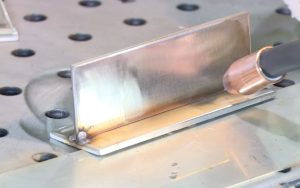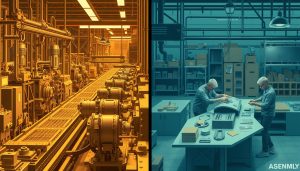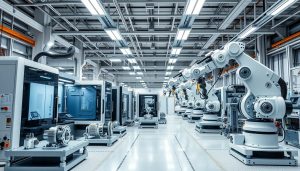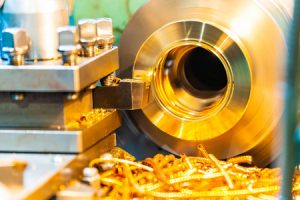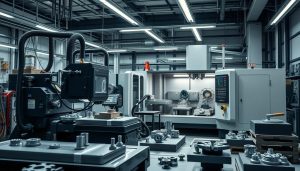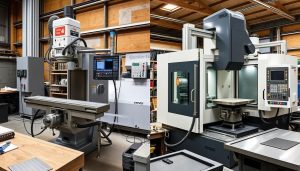In the dynamic world of modern manufacturing, precision machining has emerged as a game-changer, revolutionizing the way products are designed, engineered, and produced. This comprehensive guide delves into the intricate world of precision machining, exploring its definition, key characteristics, and the various processes that fall under this specialized field. By understanding the power and capabilities of precision machining, you’ll gain a valuable insight into the advanced manufacturing techniques that are shaping industries across the globe.
What is Precision Machining?
Precision machining is a specialized manufacturing process that utilizes advanced tools and techniques to create components with an exceptionally high level of accuracy and extremely tight tolerances. This meticulously controlled approach sets precision machining apart from traditional machining methods, allowing for the production of parts that demand the utmost precision and repeatability.
Definition of Precision Machining
Precision machining is the act of shaping and forming materials, such as metals, plastics, and ceramics, using specialized equipment and processes to achieve a level of accuracy and surface finish that far exceeds conventional manufacturing standards. This is accomplished through the use of highly precise tools, advanced computer-controlled machinery, and rigorous quality control measures.
Key Characteristics of Precision Machining
- High Accuracy: Precision machining can consistently produce parts with tolerances as tight as a few thousandths of an inch, ensuring a level of precision that is critical for many high-performance applications.
- Exceptional Surface Finish: The precise control of tools and processes in precision machining results in parts with a superior surface finish, often with a mirror-like appearance and minimal roughness.
- Repeatability: Precision machining techniques allow for the consistent reproduction of parts, ensuring that each component meets the same exacting standards time and time again.
- Tight Tolerances: The ability to maintain tight tolerances is a hallmark of precision machining, enabling the creation of parts that fit together seamlessly and function with a high degree of reliability.
By leveraging these key characteristics, precision machining plays a vital role in the production of a wide range of high-performance products, from aerospace components to medical devices, where high-precision manufacturing is essential.
Types of Precision Machining Processes
In the realm of precision machining, there are several advanced techniques that deliver exceptional accuracy and quality. From the intricate CNC milling to the precise CNC turning, these processes unlock new possibilities for manufacturing complex parts and components.
CNC Milling
CNC milling is a computer-controlled machining process that uses rotating cutting tools to remove material from a workpiece. This technique allows for the creation of complex three-dimensional parts with exceptional precision and surface finishes. CNC milling is commonly used in the production of aerospace components, medical devices, and intricate industrial parts.
CNC Turning
CNC turning is another precision machining process that involves the use of a computer-controlled lathe to shape and form parts by rotating the workpiece against a cutting tool. This method is particularly well-suited for the production of cylindrical and rotational components, such as those found in automotive and industrial applications.
Electrical Discharge Machining (EDM)
Electrical Discharge Machining (EDM) is a specialized precision machining technique that utilizes controlled electrical discharges to erode material from a workpiece. EDM is often used to create intricate and complex shapes in hard materials, making it a popular choice for the production of molds, dies, and other industrial components.
Laser Cutting and Other Techniques
In addition to CNC milling, CNC turning, and EDM, precision machining also encompasses other advanced techniques such as laser cutting. Laser cutting is a non-contact process that uses a focused, high-energy laser beam to rapidly cut through various materials with exceptional accuracy and speed. This method is widely used in the production of electronic components, aerospace parts, and other high-precision industrial applications.
Beyond these core processes, precision machining may also involve specialized techniques like grinding, honing, and lapping, which are used to achieve exceptionally tight tolerances and surface finishes.

| Precision Machining Process | Key Benefits | Common Applications |
|---|---|---|
| CNC Milling | High Accuracy, Complex Geometries | Aerospace, Medical Devices, Industrial Parts |
| CNC Turning | Precision Cylindrical Parts, Repeatability | Automotive, Industrial Machinery |
| Electrical Discharge Machining (EDM) | Intricate Shapes, Hard Materials | Molds, Dies, Aerospace Components |
| Laser Cutting | Exceptional Accuracy, Speed | Electronics, Aerospace, Industrial Parts |
Applications of Precision Machining
Precision machining is a critical technology that underpins a wide range of industries, from aerospace to automotive and beyond. Its ability to produce highly accurate and consistent components has made it an indispensable tool in numerous sectors, each with its own unique requirements and challenges.
Aerospace Industry
In the aerospace industry, precision machining is used to fabricate a variety of critical components, including turbine blades, engine parts, and structural elements. The exacting tolerances and specifications required for these components make precision machining an essential process, ensuring the safety and performance of aircraft and spacecraft.
Automotive Manufacturing
The automotive industry relies heavily on precision machining for the production of high-quality automotive parts. From engine components to suspension systems, precision machining allows manufacturers to create parts that meet the stringent performance and safety standards demanded by modern vehicles.
Medical Device Production
In the medical field, precision machining plays a crucial role in the creation of medical implants and other specialized devices. The precise control and accuracy of this technology ensures the proper fit and function of these critical medical components, ultimately improving patient outcomes and quality of life.
Electronics and Semiconductor Manufacturing
The electronics and semiconductor industries also benefit from the precision and consistency offered by precision machining. This technology is used to fabricate intricate aerospace components and circuit boards, enabling the production of advanced electronic devices and systems.
Across these diverse industries, the applications of precision machining continue to expand, underscoring its importance as a key enabler of technological progress and innovation.
| Industry | Applications of Precision Machining |
|---|---|
| Aerospace | Turbine blades, engine parts, structural elements |
| Automotive | Engine components, suspension systems |
| Medical | Medical implants, specialized devices |
| Electronics/Semiconductors | Circuit boards, electronic components |

“Precision machining is the backbone of modern manufacturing, enabling the creation of the advanced components and systems that drive progress in a vast array of industries.”
Benefits of Precision Machining
As the manufacturing industry continues to evolve, precision machining has emerged as a game-changer, offering a multitude of advantages that cater to the growing demands of modern production. From achieving unparalleled accuracy to enhancing efficiency and cost-effectiveness, precision machining has become the go-to solution for a wide range of industries, including aerospace, automotive, and medical device manufacturing.
High Accuracy and Tight Tolerance
One of the primary benefits of precision machining is its ability to produce parts with exceptionally tight tolerances. Through the use of advanced computer numerical control (CNC) technology and skilled operators, precision machining can achieve tolerances as tight as ±0.001 inches or even tighter, ensuring a level of accuracy that is simply unattainable through traditional machining methods. This high-precision manufacturing process is crucial for industries where even the slightest variation can have a significant impact on the performance and safety of the final product.
Efficiency and Cost-Effectiveness
Precision machining not only delivers superior accuracy but also enhances the overall efficiency of the manufacturing process. By utilizing automated CNC machines and streamlining production workflows, precision machining can significantly reduce waste, material consumption, and labor costs. This increased efficiency translates into cost savings that can be passed on to the customer, making precision-made products more affordable and accessible.
Material Flexibility
Precision machining is a versatile process that can handle a wide range of materials, from metals and alloys to plastics and composites. This material flexibility allows manufacturers to select the most appropriate material for their specific application, ensuring optimal performance and longevity. Whether it’s titanium for aerospace components or high-grade stainless steel for medical devices, precision machining can bring these materials to life with unparalleled precision.
By harnessing the power of tight tolerance manufacturing and efficient production, precision machining has become an essential tool in the modern manufacturing landscape. As industries continue to demand higher quality, tighter tolerances, and more cost-effective solutions, precision machining stands as a reliable and innovative answer to these challenges.
Precision Machining vs. Traditional Machining
When it comes to the world of manufacturing, the choice between precision machining and conventional machining can have a significant impact on the final product. While both techniques aim to shape and transform materials, the level of accuracy, automation, and capabilities they offer can vary greatly.
Comparison of Precision and Standard Machining Processes
Precision machining, as the name suggests, is focused on producing parts with extremely tight tolerances and exceptional quality. Using advanced computer-controlled machines, precision machining can achieve remarkable levels of dimensional accuracy, surface finish, and repeatability. In contrast, traditional or conventional machining often relies on manual or semi-automated processes, which can result in greater variability in the final product.
| Feature | Precision Machining | Conventional Machining |
|---|---|---|
| Accuracy | Extremely high, with tolerances in the micron range | Moderate to high, with typical tolerances in the range of hundredths or thousandths of an inch |
| Surface Finish | Exceptionally smooth, with micro-level surface roughness | Varying levels of surface finish, depending on the specific machining process |
| Automation | Highly automated, using CNC machines and advanced programming | Varying levels of automation, often involving manual or semi-automated processes |
| Material Versatility | Capable of working with a wide range of materials, including exotic alloys and composites | Primarily focused on traditional engineering materials like metals and plastics |
When to Choose Precision Machining
The decision to opt for precision machining over conventional techniques often depends on the specific requirements of the project. Precision machining is particularly well-suited for applications that demand exceptionally tight tolerances, complex geometries, or the use of specialized materials. Industries such as aerospace, medical device manufacturing, and high-tech electronics often rely on precision machining to ensure the quality and reliability of their products.
In contrast, conventional machining may be more appropriate for simpler, less critical parts or for projects with less stringent quality requirements. The choice between precision and traditional machining ultimately comes down to balancing the desired level of accuracy, efficiency, and cost-effectiveness to meet the specific needs of the manufacturing project.
How to Get Involved in Precision Machining
If you’re interested in a career in precision machining, there are several skills and training requirements you’ll need to consider. Precision machining is a highly technical field that demands a unique set of capabilities, from proficiency in computer-aided design (CAD) and computer numerical control (CNC) programming to expertise in metrology and quality control.
Skills and Training Required
To excel in precision machining, you’ll need a strong foundation in mathematics, engineering principles, and technical know-how. Mastering the use of CAD/CAM software, CNC machine operation, and precision measurement tools are essential. Many employers also value candidates with formal training or certification in precision machining, such as an associate’s degree or industry-recognized credentials.
Career Opportunities in Precision Machining
- CNC Operator: Responsible for programming, setting up, and operating CNC machines to produce high-precision parts and components.
- CNC Programmer: Develops and optimizes CNC machine programs to ensure accurate and efficient production.
- Quality Control Specialist: Inspects and validates the quality of precision-machined parts, ensuring they meet strict tolerances and specifications.
- Manufacturing Engineer: Designs and improves precision machining processes, optimizing workflow and productivity.
Precision machining offers a range of career opportunities, from hands-on machine operation to high-level engineering and process optimization. With the right skills and training, you can find fulfilling and well-paid CNC operator jobs or pursue other precision machining skills in industries like aerospace, automotive, and medical device manufacturing.
“Precision machining is a highly rewarding career path that allows you to use your technical expertise to create high-quality, mission-critical components. The attention to detail and problem-solving skills required can be incredibly satisfying.”
Why Choose Shixinproto for Your Precision Machining Needs
When it comes to precision machining, Shixinproto stands out as a trusted leader in the industry. With their state-of-the-art equipment and a team of experienced professionals, Shixinproto delivers exceptional results for a wide range of precision machining projects.
Shixinproto’s Expertise in Precision Machining
Shixinproto has built a reputation for their unparalleled expertise in precision machining. Their advanced CNC milling, turning, and EDM capabilities allow them to achieve the highest levels of accuracy and consistency, ensuring that your parts meet the most stringent specifications. The company’s commitment to quality is evident in every step of their manufacturing process.
Custom Solutions for Your Manufacturing Needs
At Shixinproto, they understand that every project is unique, and they pride themselves on their ability to provide custom solutions tailored to their clients’ specific needs. Whether you’re in the aerospace, automotive, medical, or electronics industries, Shixinproto has the expertise to tackle your most complex manufacturing challenges and deliver exceptional results.
Get in Touch with Shixinproto Today
If you’re in need of precision machining services for your manufacturing project, look no further than Shixinproto. Their team of experts is ready to work with you to understand your requirements and provide the perfect solution. Contact Shixinproto today to discuss your precision machining services and custom manufacturing solutions needs.
FAQ
What is precision machining?
What are the key characteristics of precision machining?
- Tight tolerances: Precision machining can achieve tolerances of just a few microns or even less.
- High accuracy: Parts produced through precision machining are incredibly accurate, with minimal deviations from the intended design.
- Excellent surface finish: Precision machining techniques result in smooth, blemish-free surfaces on the finished components.
- Repeatability: Precision machining processes can consistently produce identical parts, ensuring quality and consistency throughout production.
What are the different types of precision machining processes?
- CNC Milling: A computer-controlled milling process that can create complex 3D shapes with high accuracy.
- CNC Turning: A computer-controlled turning process for producing cylindrical parts with tight tolerances.
- Electrical Discharge Machining (EDM): A non-contact machining process that uses electrical discharges to remove material, allowing the creation of intricate shapes.
- Laser Cutting: A precise cutting technique that uses a focused laser beam to cut through materials with high precision.
What are the key applications of precision machining?
- Aerospace: For manufacturing critical components like turbine blades, engine parts, and structural elements.
- Automotive: For producing high-precision engine components, transmission parts, and other automotive systems.
- Medical: For fabricating medical devices, implants, and surgical instruments with tight tolerances.
- Electronics: For manufacturing delicate electronic components, circuit boards, and semiconductor parts.
What are the benefits of using precision machining?
- High accuracy and tight tolerances: Precision machining can produce parts with exceptionally tight tolerances, ensuring a perfect fit and functionality.
- Efficiency and cost-effectiveness: Precision machining techniques can optimize production processes, reducing waste and lowering manufacturing costs.
- Material flexibility: Precision machining can work with a wide range of materials, from metals to plastics, allowing greater design flexibility.
How does precision machining differ from traditional machining?
- Tolerance levels: Precision machining can achieve much tighter tolerances, typically in the range of microns, compared to the larger tolerances of traditional machining.
- Automation and control: Precision machining often utilizes advanced CNC technology and computer control, enabling higher levels of automation and precision.
- Surface finish: Precision machining results in a superior surface finish, with minimal imperfections and a smoother appearance.
What skills and training are required for precision machining?
- Knowledge of CAD/CAM software for designing and programming parts
- Proficiency in CNC programming and operation
- Understanding of metrology and quality control techniques
- Mechanical aptitude and problem-solving skills
- Specialized training in precision machining techniques and equipment operation.
